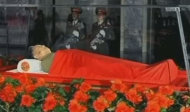Could Kim Jong Il's Death Lead to Reunification?More From 
More than any other nation, South Korea feels most threatened by the
North. Indeed, the two neighbors are still technically at war. So
Pyongyang's announcement yesterday of Kim Jong Il's death sent Seoul
scrambling. Frazzled lawmakers packed up their things and rushed out of
party meetings. The KOSPI tumbled. According to the Korean press, the
nation's defense minister heard the news from North Korean television
like millions of others. President Lee Myung Bak cleared his desk for
the day and put his nation's military on the highest alert.
Since he came to power in 2008, Lee, a former CEO, has taken a
no-nonsense approach to the unpredictable North. He reversed the South's
nearly decade-long "sunshine policy" of engagement with Pyongyang which
was forged to persuadethe North to behave better. Instead, Lee, 70,
played hardball. Referring to the previous years as the "lost decade,"
Lee put into place a revised strategy that made South Korean aid
contingent on the North's dismantling its arm program.
It wasn't cold-hearted as much as an attempt to rein in the North. "Lee
took a very tough line toward North Korea," says Gi-Wook Shin, director
of the Seoul-based Shorenstein Asia-Pacific Research Center. Shin likens
the administrations' differing policies to parents who take opposing
disciplinary roles for the good of their child. "He has been playing the
'bad cop' role. That doesn't mean it's necessarily bad." Nevertheless,
Lee's approach has drawn its share of criticism. It was under his watch
that Pyongyang's worst provocations in recent North-South relations have
taken place: the sinking of the South Korean warship that killed 46
sailors in March 2010, and, less than a year later, the shelling of
Yeonpyeong Island that killed two soldiers and two civilians.
Now that Kim is gone, Lee could seize the moment to smooth things over. A
similar opportunity presented itself toSeoul in 1994, after the death
of Kim's father, longtime North Korean leader Kim Il Sung. The then
South Korean president, Kim Young-sam, was scheduled to meet Kim Il Sung
for a much-anticipated summit, but Kim Il Sung died of a sudden heart
attack before the set date. Kim Young Sam "didn't show any goodwill
toward North Korea" after his death, says Shin, and that angered
Pyongyang. On Tuesday Seoul sent condolences to Pyongyang and said some
representatives, but not an official delegation, might go next week's
funeral. "This could be an opportunity for Lee to improve relations with
North Korea," says Shin, "if he wants to."
Should he want to? A conciliatory gesture would not go down well with
Lee's conservative base, and as South Korea enters an election year, it
might be a political risk he and his party are unwilling to take. But
there is also the larger question of whether closer ties necessarily
guarantee any more stability, especially in a post-Kim era. Since his
inauguration, Lee has emphasized that South Korea's foreign policy
should not be defined by its relations with the North, and has focused
on strengthening ties with the U.S., China, Japan and Russia.
After the Korean War, South Korea's de facto foreign policy was
anti-communist -- ergo anti-North -- for more than 20 years. There were
moments when relations thawed, such as the planned summit in 1994, but
things didn't really change until the election of Kim Dae Jung in 1997
and the introduction of the sunshine policy. Wayne Patterson, a history
professor at St. Norbert College in the U.S., sums up the thinking
behind Kim Dae Jung's rapprochement like this: "'Maybe if we're nice to
North Korea, they'll be nice back.'"
They weren't. Kim Dae Jung met with Kim Jong-il in 2000, a landmark
summit that helped earn him a Nobel Peace Prize and for which, it later
came out, Seoulgave about $500 million to Pyongyang. After the South and
the U.S. started delivering food aid to the North, where a catastrophic
famine had killed up to two million people in the 1990s, evidence began
piling up that the North Korean military was skimming off a significant
portion of the aid. Pyongyang would not allow international monitors in
to verify that the food was going to the children and elderly citizens
who needed it most. Meanwhile, the North continued to build up its
nuclear arms program, testing its first nuclear weapon in 2006. (The
second and last was in 2009.) "To cut to the bottom line, it didn't
work," says Patterson. Kim Dae Jung's successor Roh Moo Hyun continued
the policy, but, notes Patterson, "North Korea did not modify its
behavior."
Many analysts question whether Kim Jong Un, Jong Il's son and named
successor, is ready to take the reins of his family dynasty after only a
little over a year in the spotlight at his father's side. "Nobody will
really challenge him," says Shin. "But that doesn't mean that he'll
succeed." If the young Kim and his advisers can't keep their frail
economy afloat, the nation could face an economic collapse -- or even a
revolt. "A popular uprising is very unlikely, but it's not out of the
question," says Charles Armstrong, director of the Center for Korean
Research at Columbia University "Nobody predicted the Arab Spring a year
ago."
Given a crisis of that magnitude, Lee's administration may not be able
to resist gunning for a unified Korean peninsula. "Seoul is looking very
carefully to see any signs of instability or change in North Korea
following the death of Kim," says Armstrong. The idea has loomed large
in South Korea's national psyche ever since the countries were split at
the end of World War II, though today thenotion's popular support stems
more from political correctness than real conviction that life would be
better under unification. There are, after all, some clues as to what
might await the South. When West Germany integrated East Germany, the
cost of absorbing the poorer nation was enormous, says Patterson, and
the wealth gap between South and North Korea is much larger than it was
between East and West Germany.
Still, the South Korean government is doing its best to keep unification
relevant. Last year, it proposed a special tax that would set aside
money to help pay for the cost of one day integrating the North into the
domestic economy. Recently it launched an online television channel
aimed at getting South Korea's younger generation, for whom the war is
distant history, thinking about reuniting with the North.But even those
who publicly support the nostalgic concept of a unified Korean peninsula
may privately question whether South Korea can handle it. "What would
happen if 15 million starving, poor North Koreans flood into the border
looking for jobs and homes?" Patterson says. "Can [they] actually do
it?"
Also, when it comes to erratic nuclear states, there is no such thing as
a bilateral decision. Since 2003, South Korea has been joined by the
U.S., Russia, China and Japan in the so-called Six Party talks on North
Korea's nuclear program. Though the talks have been stalled since 2008,
just days before Kim's death, news emerged that a major announcement
over U.S. food aid and Pyongyang's cessation of uranium enrichment would
soon be made.






